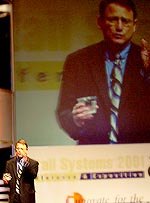Article
Retail Systems keynote advice: Say no to Web kiosks
Gerald Storch, vice chairman of Target Corp., wants retailers to "Stop the Stupidity." There's a lot more at stake than Web kiosks.
March 24, 2002
CHICAGO - As Gerald L. Storch, vice chairman of Target Corp., summarized his keynote address at the Retail Systems 2001 trade show in Chicago's McCormick Place, he advised retailers, "Put Web kiosks in your stores - lots!"
Storch was being ironic.
The newly minted vice chairman-he took the post earlier this year-spoke without notes in front of a packed audience. Marketing and communications manager Morgan Devlin estimated the crowd to number more than 1,200 conference attendees. A dynamic speaker, Storch paced the large stage, his image magnified on a television monitor behind him.
Storch said that Target's experiments with Web kiosks showed that customers laughed at
 |
Target Corp. vice chairman Gerald L. Storch urges retailers to "Stop the stupidity." |
"She (Target customers, who are primarily female), doesn't want it because it's insulting to her. Why drive to the store when she can do it at home?"
Storch said that many types of kiosks were good for stores, just not the Web kiosks that customers would use to buy out of stock items. He said that gift registries were a sensible application, as well as store directories, information applications that explain products in detail, job application kiosks, and ATMs.
In order for a kiosk to be worthwhile, it had to have a specific value-added application, Storch said. It shouldn't be put in stores just because it's a kiosk and it's on the Web.
Reactions
After the keynote, some kiosk exhibitors commented on the keynote.
 |
Storch's keynote is instantly translated into Japanese and beamed wirelessly by translators in a booth at the back of the auditorium. |
Standing at NCR's booth in the exhibit hall, where the exhibit staff were undergoing last minute training before the hall opened at noon, Rob Vawdrey, vice president of NCR's retail solutions division, store automation products, said, "I agree with him (Storch). That's not what we sell Web kiosks for."
Kiosks need to have an integrated, multi-channel strategy, he said.
He referred to good retail kiosk strategy as range extension. Information kiosks make it possible for shoppers to get more choices than they can at the store. For example, a customer shopping for furniture can learn how a couch would look with different colors and fabrics. These virtual stores help customers make decisions.
"But you still need to go to the store to engage with the product," Vawdrey said.
Dave Murphy, director of marketing and business development for Wincor Nixdorf, said, "I think a Web device is a dead device in the store."
Web devices force customers to do too much work, he said. More focused applications that make kiosks into transactional devices were more valuable for the retailer as well as the customer.
"Be careful as a retailer not to put another disparate device in the store," Murphy warned.
More than kiosks
Storch, who first came to Target in 1993 after working as a partner at McKinsey & Co. management consultants, was less concerned with kiosks than in urging retailers to adopt uniform standards for business-to-business exchanges.
These exchanges are Web interfaces which retailers and manufacturers use to communicate and conduct business, and make sales. The idea behind creating exchanges was to make business-to-business transactions more efficient and less costly.
Storch's address, "Accelerate the Retail Supply Chain," was subtitled, "Stop the stupidity."
He warned retailers that the proliferation of different exchanges such as WWRE, GNX, Transora, and others, was counterproductive. All exchanges have different pricing, and spend too much money in development.
"There is no proprietary advantage to doing this," Storch said. "I strongly believe these exchanges have to come together."
Standardization
In addition to creating one standard exchange, Storch urged the adoption of standards in other areas such as radio frequency identification labels (RFID), which can track the ID of any specific item in a store. These wireless IDs can be used to automatically record purchases as items are placed in a wireless-enabled shopping cart.
Electronic shelf labels, when standardized and made to look more appealing to consumers, can simplify a costly in-store chore - changing the thousands of labels when prices change. Both types of standards could have applications in retail store kiosk systems.
Busting Internet myths
Storch also debunked a few Internet myths that became evident in the last year as dot-coms fell. Among the myths that proved to be false:
- Stand-alone e-commerce companies will do better than multi-channel operations.
- The Internet is more efficient than stores.
- Everyone hates shopping.
Studies show that most people love shopping, Storch said, among them the 80 percent of target shoppers who are female. While some people hate shopping, Storch said the activity was the last leg in the capitalist supply chain, in which people got to reap the rewards of their labor.







